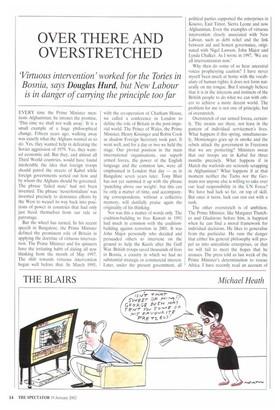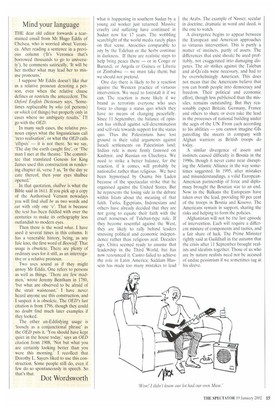OVER THERE AND OVERSTRETCHED
'Virtuous intervention' worked for the Tories in Bosnia, says Douglas Hurd, but New Labour is in danger of carrying the principle too far
EVERY time the Prime Minister mentions Afghanistan, he intones the promise, 'This time we shall not walk away.' It is a small example of a huge philosophical change. Fifteen years ago, walking away was exactly what the Afghans wanted us to do. Yes, they wanted help in defeating the Soviet aggression of 1979. Yes, they wanted economic aid. But they, and almost all Third World countries, would have found intolerable the idea that foreign troops should patrol the streets of Kabul while foreign governments sorted out how and by whom the Afghans should be governed. The phrase 'failed state' had not been invented. The phrase 'neocolonialism' was invented precisely to denounce efforts by the West to weasel its way back into positions of power in countries that had only just freed themselves from our rule or patronage.
But the wheel has turned. In his recent speech in Bangalore, the Prime Minister defined the prominent role of Britain in applying the doctrine of virtuous intervention. The Prime Minister and his spinners have the irritating habit of dating all new thinking from the month of May 1997. The shift towards virtuous intervention began well before that. In March 1995,
with the co-operation of Chatham House, we called a conference in London to define the role of Britain in the post-imperial world. The Prince of Wales, the Prime Minister, Henry, Kissinger and Robin Cook as shadow Foreign Secretary took part. It went well, and for a day or two we held the stage. Our pivotal position in the main international organisations, our superb armed forces, the power of the English language and the common law, were all emphasised in London that day — as in Bangalore seven years later. Tony Blair has not yet summed it up with the phrase 'punching above our weight', but this can he only a matter of time, and accompanying correspondents, without a collective memory, will dutifully praise again the originality of his thinking.
Nor was this a matter of words only. The coalition-building to free Kuwait in 1991 had much in common with the coalitionbuilding against terrorism in 2001. It was John Major personally who decided and persuaded others to intervene on the ground to help the Kurds after the Gulf War. British troops saved thousands of lives in Bosnia, a country in which we had no substantial strategic or commercial interest. Later, under the present government, all political parties supported the enterprises in Kosovo, East Timor, Sierra Leone and now Afghanistan. Even the examples of virtuous intervention closely associated with New Labour, such as debt relief and the link between aid and honest governance, originated with Nigel Lawson, John Major and Lynda Chalker. As I wrote in 1997, 'We are all interventionists now.'
Why then do some of us hear ancestral voices prophesying caution? I have never myself been much at home with the vocabulary of human rights; it does not form naturally on my tongue. But 1 strongly believe that it is in the interests and instincts of the British people to do what we can with others to achieve a more decent world. The problem for me is not one of principle, but of overstretch.
Overstretch of our armed forces, certainly. The strains are there, not least in the pattern of individual servicemen's lives. What happens if this spring, simultaneously, Montenegro goes up in smoke and the rebels attack the government in Freetown that we are protecting? Ministers swear that our troops are in Kabul for three months precisely. What happens if in March the warlords are seriously scrapping in Afghanistan? What happens if at that moment neither the Turks nor the Germans nor anyone else is willing to take over our lead responsibility in the UN Force? We have had luck so far, on top of skill. But once it turns, luck can run out with a rush.
The other overstretch is of ambition. The Prime Minister, like Margaret Thatcher and Gladstone before him, is happiest when he can find a moral framework for individual decisions. He likes to generalise from the particular. He runs the danger that either his general philosophy will propel us into unrealistic enterprises, or that we will fail to meet the hopes that he arouses. The press told us last week of the Prime Minister's determination to rescue Africa. I have recently read an account of what is happening in southern Sudan by a young aid worker just returned. Massive cruelty and suffering have continued in Sudan now for 17 years. The wobbling searchlight of the world media rarely plays on that scene. Atrocities comparable to any by the Taleban or the Serbs continue in darkness. If there are realistic steps to help bring peace there — or in Congo or Burundi. or Angola or Guinea or Liberia or Zimbabwe — we must take them; but we should not pretend.
One day there is likely to be a reaction against the Western practice of virtuous intervention. We need to forestall it if we can. The reaction is more likely if we brand as terrorists everyone who uses force to change a status quo which they have no means of changing peacefully. Since 11 September, the balance of opinion has shifted against self-determination and self-rule towards support for the status quo. Thus the Palestinians have lost ground in their valid arguments against Israeli settlements on Palestinian land; Indian rule is more firmly fastened on Kashmir, and Russian on Chechnya. We need to strike a better balance, for the reaction, if it comes, will probably be nationalist rather than religious. We have been hypnotised by Osama bin Laden because of the spectacular strike that he organised against the United States. But he represents the losing side in the debate within Islam about the meaning of that faith. Turks, Egyptians, Indonesians and others have already decided that they are not going to equate their faith with the cruel nonsenses of Taleban-type rule. If they become resentful against the West, they are likely to rally behind leaders stressing political and economic independence rather than religious zeal. Decades ago, China seemed ready to assume that leadership in the Third World, but has now renounced it. Castro failed to achieve the role in Latin America; Saddam Hussein has made too many mistakes to lead the Arabs. The example of Nasser, secular in doctrine, dramatic in word and deed, is the one to watch.
A divergence begins to appear between the European and American approaches to virtuous intervention, This is partly a matter of instincts, partly of assets. The differences that exist should be used profitably, not exaggerated into damaging disputes. The air strikes against the Taleban and al-Qa'eda were necessary, and had to be overwhelmingly American. This does not mean that the Americans believe that you can bomb people into democracy and freedom. Their political and economic effort, though less publicised than the missiles, remains outstanding. But they reasonably expect Britain. Germany, France and others to share or even take the lead in the processes of national building under the aegis of the UN. From each according to his abilities — you cannot imagine GIs patrolling the streets in company with Afghan warriors as British troops do today.
A similar divergence of assets and instincts caused difficulty in Bosnia in the 1990s, though it never came near disrupting the Atlantic Alliance in the way sometimes suggested. In 1995, after mistakes and misunderstandings, a valid EuropeanAmerican partnership of force and diplomacy brought the Bosnian war to an end. Now in the Balkans the Europeans have taken over the lead, providing 80 per cent of the troops in Bosnia and Kosovo. The Americans remain in support, sharing the risks and helping to form the policies.
Afghanistan will not be the last episode of intervention. Each will require a different mixture of components and tactics, and a fair share of luck. The Prime Minister rightly said at Guildhall in the autumn that the crisis after 11 September brought realists and idealists together. Those of us who are by nature realists need not be accused of undue pessimism if we sometimes tug at his sleeve.































































 Previous page
Previous page